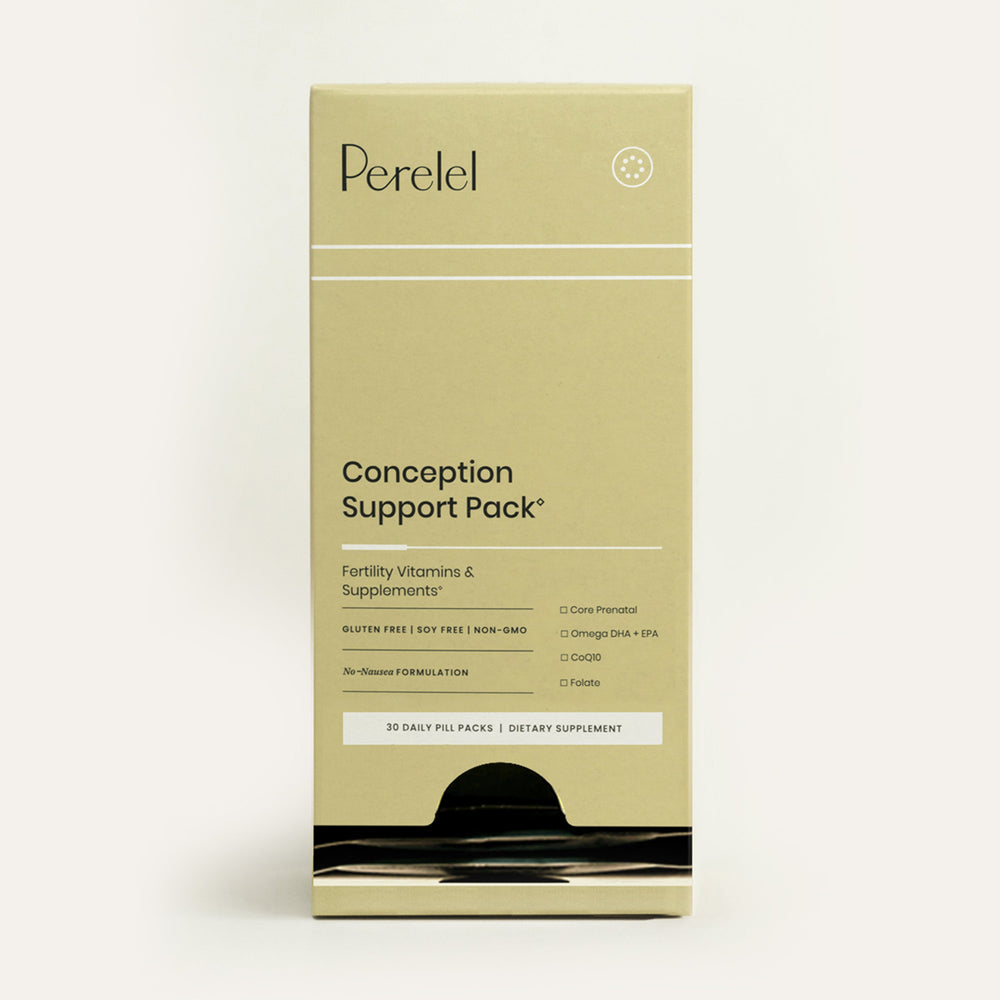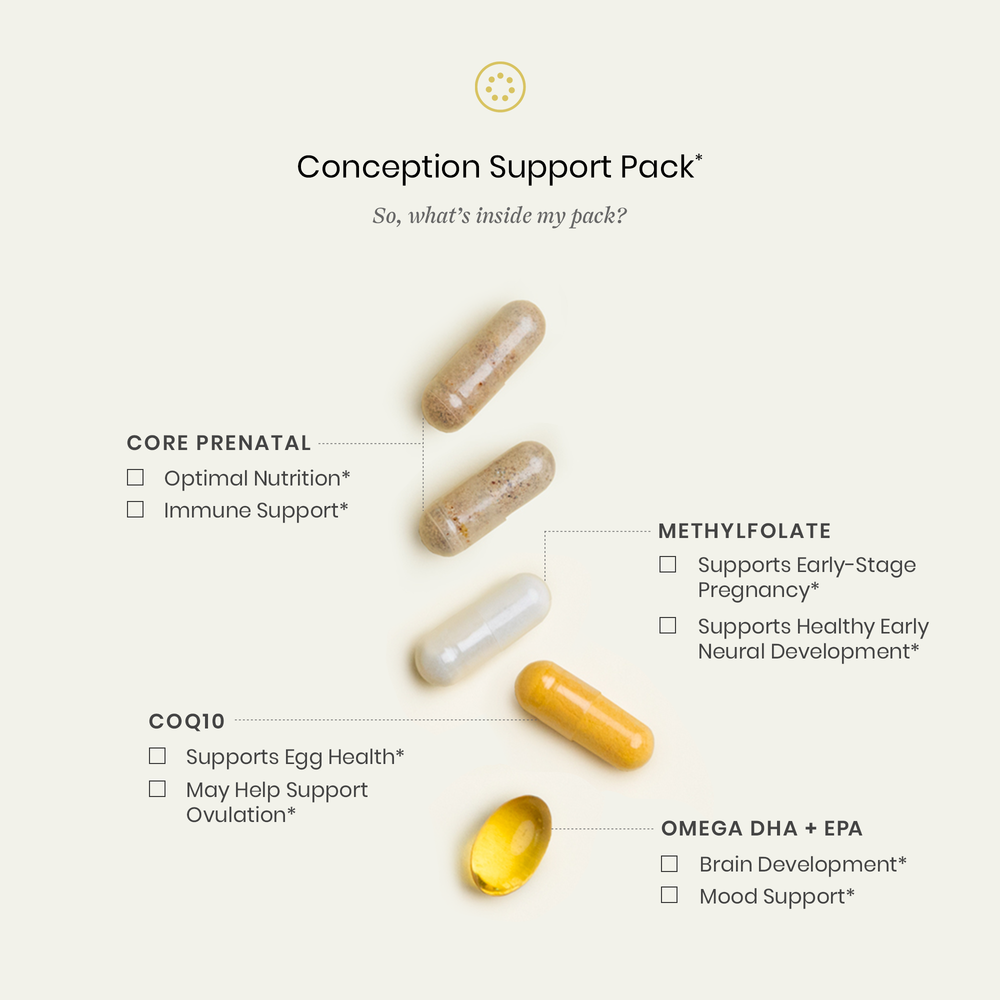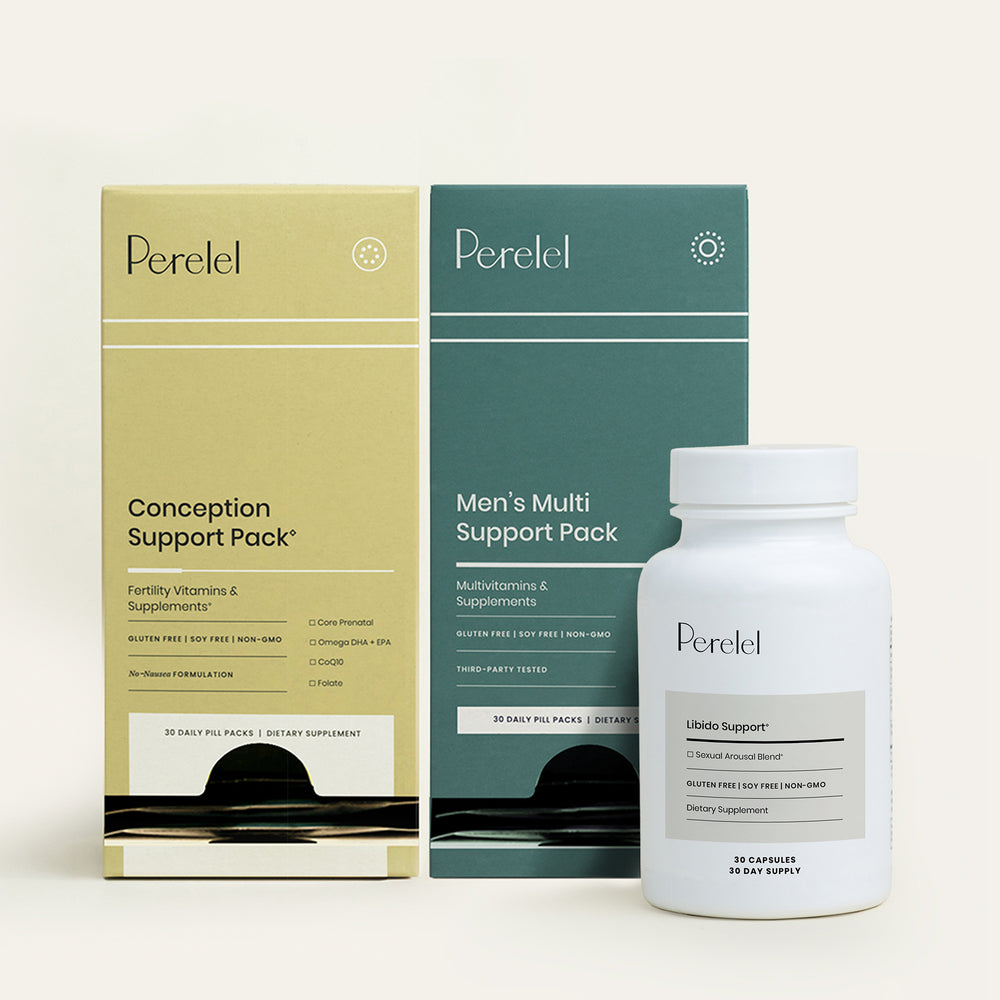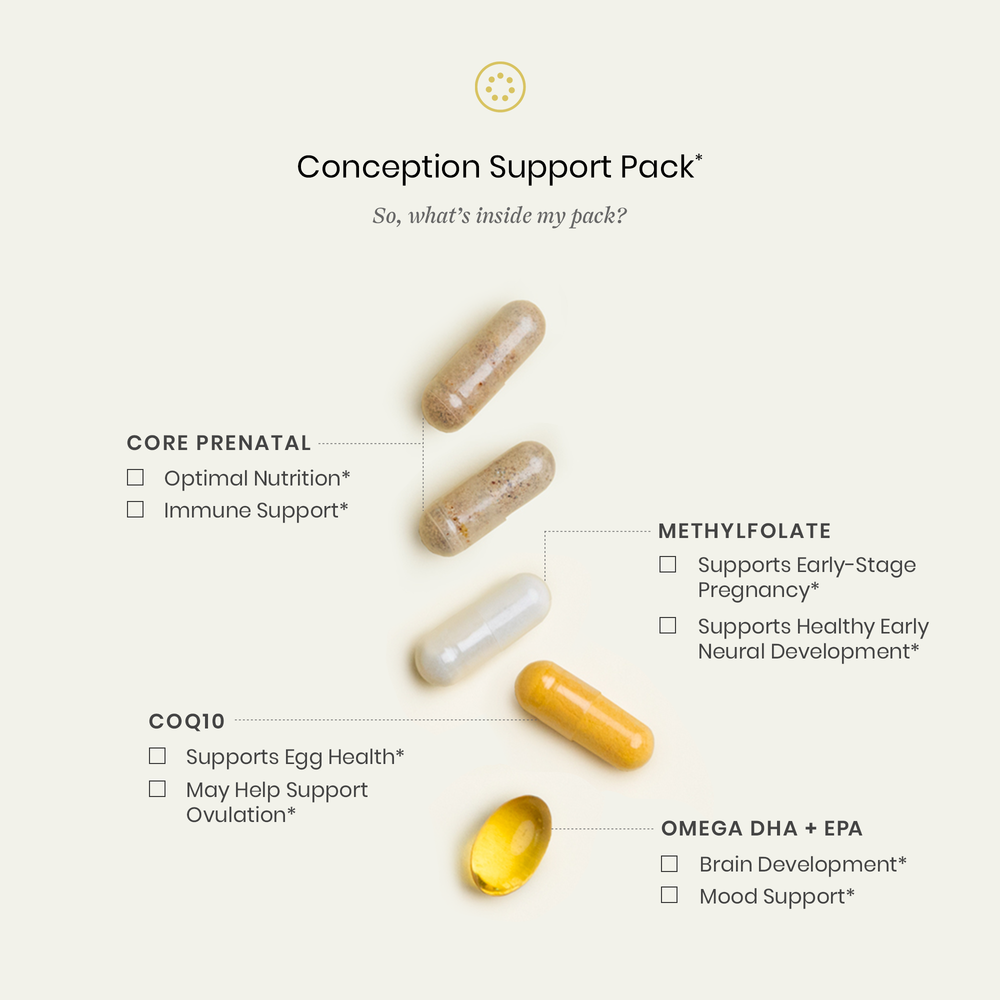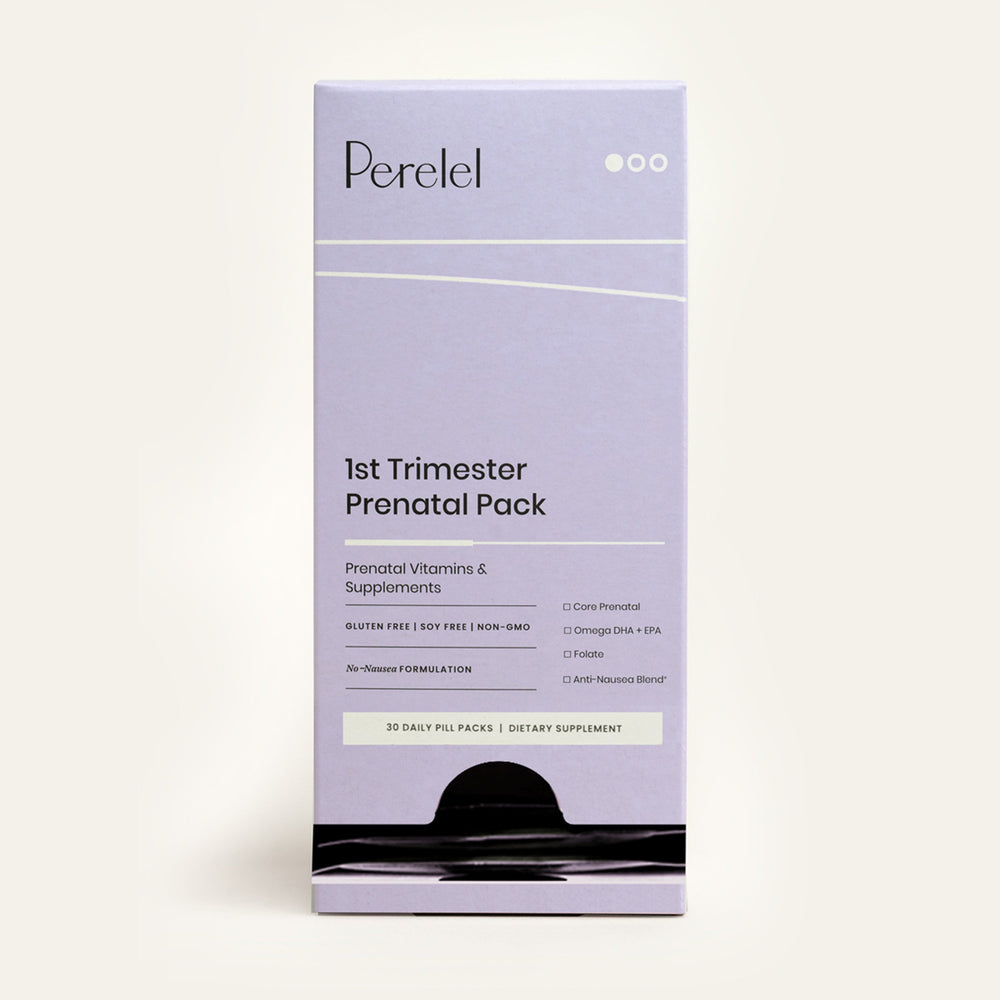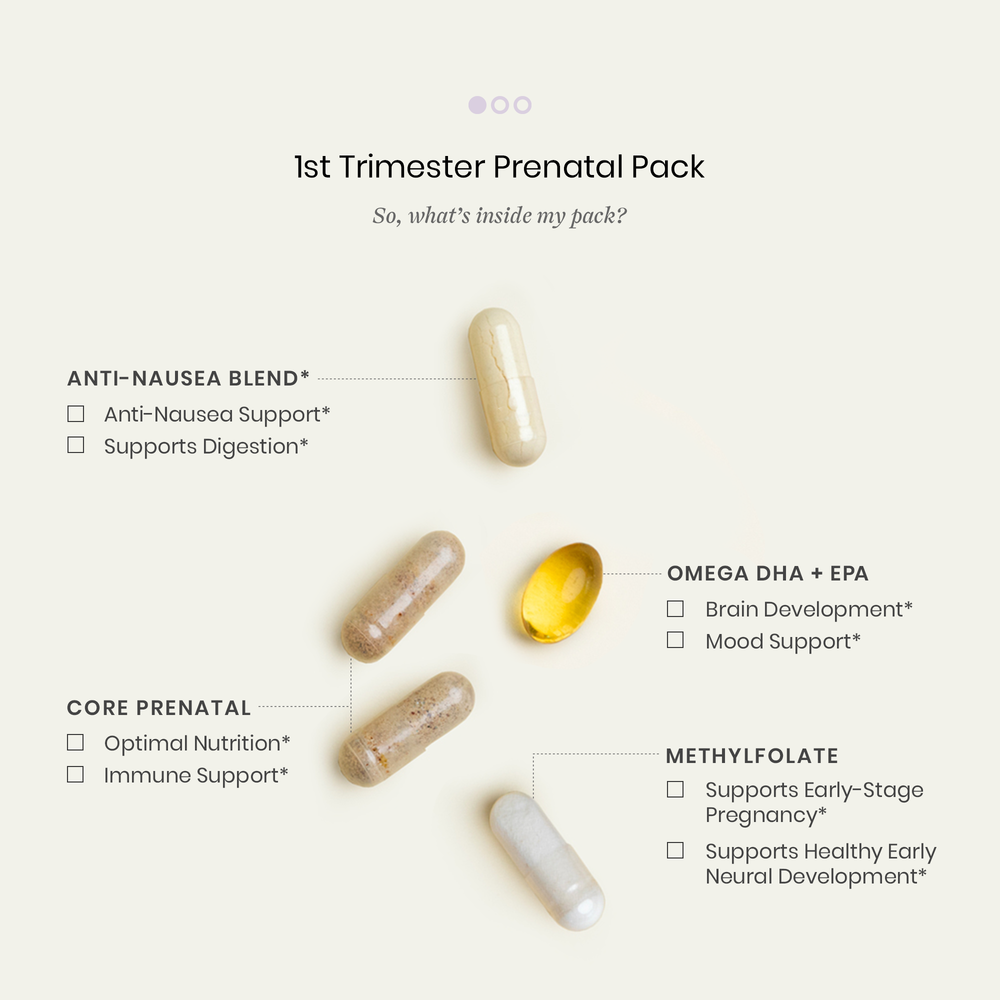It’s natural to associate prenatal vitamins with pregnancy specifically: After all, experts and government organizations like the American College of Obstetricians and Gynecologists (ACOG) and the CDC recommend taking a prenatal to support your health and baby’s growth through each trimester. But what you might not realize is that ideally, you should actually start your prenatal vitamin routine several months before pregnancy.
Many of the nutrients in prenatal vitamins are particularly important for early pregnancy—there are certain development milestones that happen during those critical first few weeks, before you might even realize that you’re pregnant. That’s why preparing your body sooner rather than later is a good idea.
Below, let’s get into the details of when you should start taking a prenatal vitamin—and why it’s important for a healthy pregnancy.
First, why is it important to take prenatal vitamins?
Your nutritional needs during pregnancy are heightened—and meeting them is essential to support both your health and baby’s development. Nutrients like folate, iron, calcium, vitamin D, omega-3 fatty acids, B vitamins, and vitamin C are of particular importance—we’ll get into why below. It’s important to know that meeting your nutrient needs through diet alone isn’t always possible for a variety of reasons, which is why experts recommend supplementing with prenatal vitamins.
When should I start taking prenatal vitamins?
Many women don’t start taking prenatal vitamins until after they find out they’re pregnant—but ideally, you’ll incorporate them into your routine much earlier than that, so that your nutrient levels are covered when you do conceive.
Dr. Banafsheh Bayati, MD, OB/GYN, FACOG, and our medical co-founder, recommends starting to prepare your body for pregnancy as early as 6 months before you’re ready to conceive. That includes taking steps like making a plan with your doctor to address any imbalances, prioritizing a healthy diet, and yes—starting a prenatal vitamin routine.
“Even if a woman has an excellent diet, it’s still critical that she optimize minerals, such as iron, and vitamin levels prior to becoming pregnant,” says Dr. Bayati. “Starting three to six months before a desired pregnancy with a folate-based prenatal that contains adequate amounts of vitamin D and omega-3 DHA is a great way to optimize her health and the health of the baby, and protect against birth defects.”
Better yet, you’ll opt for prenatal vitamins that were made specifically for pre-pregnancy— like our Conception Support Pack,* which was formulated by leading fertility doctors to support egg health, healthy ovulation, and early pregnancy nutrition.*

What should I look for in a prenatal vitamin?
Not all prenatal vitamins are created equal—while there are countless options on the market, zeroing in on things like nutrient content, ingredient quality, and even the way they’re tailored to your exact stage of pre-pregnancy or pregnancy can make all the difference in getting optimal nutrition for both you and baby. In other words, now is not the time to compromise.
Our medical panel recommends considering the following checklist when shopping for prenatal vitamins:
-
Nutrient content. Your prenatal multivitamins should contain a lineup of nutrients that have been deemed essential for your nutrition and baby’s development during this time. There are 11 key nutrients in particular that our doctors have labeled as necessary, according to dietary guidelines and the latest clinical research:
-
Folate, which is absolutely critical during early pregnancy for healthy neural, heart, and face development, and for supporting the prevention of certain birth defects like spina bifida. Many prenatal vitamins use folic acid, the synthetic form of folate—but up to 60 percent of women have a genetic variation that prevents them from properly processing folic acid. We only use methylated folate, the more active form of this B vitamin in our prenatals for this reason.1
-
Iron—our iron requirements increase significantly during pregnancy to support the growth and development of the fetus and placenta (as well as the increased demands for blood cells to transport oxygen). Not meeting these demands can make pregnant women more susceptible to anemia.2
-
Vitamin A, which is involved in the regulation of gene expression, growth, and development, cellular production, vision, and immunity.
-
Vitamin B complex, since B-vitamins (beyond just folate!) are key to supporting both your and baby’s health.
-
Vitamin C, an antioxidant that supports strong teeth and bones, and supports a healthy immune system. Some studies show that vitamin C plays a role in preventing preeclampsia.
-
Vitamin D—it’s estimated that up to 50% of people have vitamin D insufficiency, so supplementing is crucial to support bone health, mood, and immune function.
-
Vitamin E, an antioxidant that supports eye health, brain health, and egg quality.
-
Choline, which supports nutrient transport across the placenta, as well as fetal neurodevelopment. This is a common nutrient deficiency for pregnant women, so supplementation is really important during this time.
-
Omega DHA + EPA, essential fatty acids that support baby’s brain development and your mood throughout pregnancy. Note that omega-3 EPA helps omega-3 DHA cross the placenta, so it’s important to have both in your prenatal vitamins.
-
Zinc, which is a common deficiency during pregnancy.
-
Iodine, which is crucial for thyroid support (but difficult to get enough of through diet alone).3
-
-
Ingredient quality and bioavailability. Adding nutrients to a prenatal ingredient list is just one part of the equation—we also have to ensure that those nutrient forms are easily processed by the body. Opting for folate over folic acid is a great example—methylated folate is the more active form, so it requires less processing from your body. Another example is iron: Iron supplements can be tough on the stomach, which is why we use a special form called chelated iron—it’s gentler and helps you avoid pill aversion during a time when nausea is already an issue for many women.
-
Doctor-backed formulas. Fertility experts, OB/GYNs, and reproductive health practitioners can all offer expert perspectives on appropriate supplementation during this chapter—because their job is to connect the latest clinical research with the patients they see every day. It’s why we’re proud to be the first OB/GYN-founded prenatal vitamin brand, and why a panel of leading medical experts formulates every single one of our products.
-
Targeted formulas for your specific stage. Most prenatal vitamins are one-size-fits-all: You take the same formula during pre-pregnancy, each trimester, and even postpartum. Yet our nutrient needs and symptoms change throughout each of these stages—so it doesn’t make sense to us that most prenatals don’t change with us.
Let’s say you’re actively trying for a baby, as an example: While experts and regulating bodies agree that you should take a prenatal vitamin several months before conception, most prenatal vitamins don’t consider things like egg health and fertility. Similarly, your nutrient needs and symptoms in early pregnancy are actually pretty different than your nutrient needs when you’re about to give birth—and incredibly different than the nutrient demands of the 4th trimester, or postpartum.
It’s why we created a stage-specific solution that actually considers all these key differences—to give you the targeted support you need, in the amounts you need, when you need it:
Shop the Article:
-
Our Conception Support Pack* was specifically formulated to prepare your body for pregnancy. In addition to a prenatal vitamin to support early pregnancy nutrition, it includes CoQ10 to support egg health and ovulation, as well as additional folate too because of its crucial role in the earliest weeks of pregnancy.*
-
Our 1st Trimester Pack* considers both the nutrient demands of early pregnancy and the symptoms that many women experience during this time. That means an anti-nausea support capsule with vitamin B9 and ginger to help with morning sickness. (Our medical panel really thought of everything.)
-
Our 2nd Trimester Pack* was formulated to support both the growth milestones of the second trimester and symptoms like muscle cramps. In addition to our Core Prenatal, this pack contains additional calcium and magnesium to support those changes.
-
Our 2nd Trimester Pack* was formulated to support both the growth milestones of the second trimester and symptoms like muscle cramps. In addition to our Core Prenatal, this pack contains additional calcium and magnesium to support those changes.
-
Our 3rd Trimester Pack* was designed to support baby’s rapid growth and prepare your body for birth. We even added probiotics to help out with some of the digestive challenges women tend to experience during this time.
-
Our Mom Multi Support Pack* was created to support the demands of the 4th trimester, breastfeeding, and every chapter of motherhood beyond. It includes a full-spectrum multivitamin, added omegas for mood support, a beauty blend to target postpartum hair loss, and an anti-stress blend.
-
Are there any side effects to prenatal vitamins I should watch out for?
Due to the higher concentrations of certain nutrients, some prenatal vitamins can come with some minor side effects like constipation and nausea. To combat these effects, healthcare providers will typically suggest drinking plenty of fluids, upping the fiber content in your diet, staying active, and possibly taking a stool softener to help relieve some of these symptoms.
“Occasionally there are reasons why you should not take a prenatal vitamin that contains certain ingredients, like iron for those with an iron storage disease,” says Dr. Bayati. But this is exactly why it’s important to discuss your plans with your doctor and find the right prenatals for you.”
Can I take a prenatal vitamin if I’m not pregnant—and not currently planning to be?
In addition to benefiting unborn babies, prenatal vitamins support skin, hair and nail health, as well as energy and mood. But anyone considering taking prenatal vitamins should first consult with their healthcare provider,” says Dr. Bayati.
“Supplements should be taken with care to make sure they are clean and smartly designed for your needs. They can be prescribed to help patients who are looking to optimize their health,” she says. FWIW, we include some of the same beauty ingredients in our Daily Vitamin Trio, our multivitamin pack which was designed for women who are supporting their daily wellness outside of pregnancy.
What makes Perelel’s prenatal vitamins different?
There’s a lot of pressure to select the best prenatal vitamin. After all, it’s one of the first and most important things you can do for your unborn baby. But with so many options available, it can be quite an overwhelming decision.
That’s where we come in. Ours is the first and only prenatal vitamin company to be founded by an OB/GYN alongside a team of top maternal-fetal medicine and fertility doctors. Our formulas are designed with clinically-tested ingredients at doctor-recommended doses. They’re gluten free, soy-free and non-GMO, and they don’t contain any colorants or synthetic fillers.
And again, because your needs change throughout your pregnancy journey, our vitamin packs do, too. We provide vitamins and minerals tailored to each unique stage of the motherhood journey: pre-pregnancy, each trimester, postpartum, and beyond throughout motherhood. As your body changes, Perelel dynamically changes with you to give you the exact nutrients you need. Plus, since you have enough to remember (and because pregnancy brain is a real thing), we offer a convenient subscription service—we’ll send you everything you need for each trimester, at the exact time you need it.
Newly pregnant? Check out more first trimester tips for pregnancy.
This article is for informational purposes only. It is not, nor is it intended to be, a substitute for professional medical advice, diagnosis, or treatment and we recommend that you always consult with your healthcare provider. To the extent that this article features the advice of physicians or medical practitioners, the views expressed are the views of the cited expert and do not necessarily represent the views of Perelel.
Resources:
1) Pi T, Liang YQ, Xia HY, Liu YQ, You LN, Zhu Z, Wang L, Gu X, Jin XF. Prevalence of the methylenetetrahydrofolate reductase 677C>T polymorphism in the pregnant women of Yunnan Province, China. Medicine (Baltimore). 2020 Nov 6;99(45):e22771. doi: 10.1097/MD.0000000000022771. PMID: 33157923; PMCID: PMC7647581.
2) Thiele LRDuryea ELRagsdale AS, et al. Direct Dispensation of Prenatal Supplements With Iron and Anemia Among Pregnant People. JAMA Netw Open. 2023;6(9):e2332100. doi:10.1001/jamanetworkopen.2023.32100
3) Nutrition during pregnancy. ACOG. (n.d.-c).



